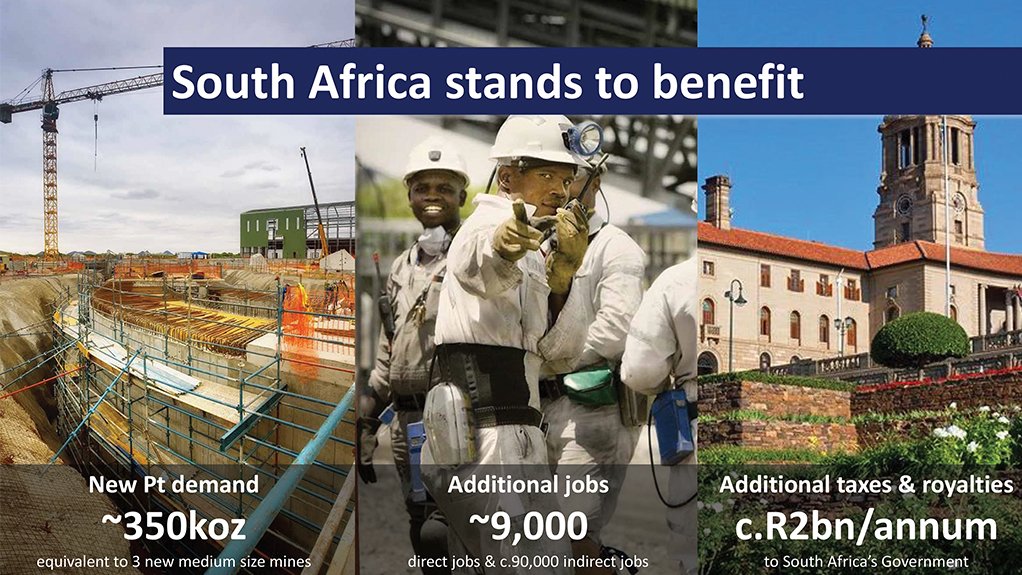PGMs to play ever-increasing roles in greener, cleaner world



The number of indirect jobs totals 90 000
Hydrogen generation and storage are a key contribution
Platinum group metals (PGMs) mining company Anglo American Platinum is convinced that PGMs are poised to play increasingly significant roles in a greener, cleaner world, driven by favourable new opportunities presented by societal megatrends.
Anglo American Platinum CEO Chris Griffith, who presented a major address at the recent Investing in African Mining Indaba, in Cape Town, says PGMs are earmarked to unlock the versatility of green hydrogen in both stationary power generation and transport, where hydrogen can be used with PGMs in fuel cells.
PGM catalysts in electrolysers can produce hydrogen from renewable-energy sources that can be stored indefinitely as an on-demand energy source and PGM catalysts in different types of fuel cells, including proton exchange membrane fuel cells used in vehicle mobility applications to convert hydrogen back into electricity.
“We’re starting to see real traction taking place right across the globe,” Griffith says, with 18 countries now having detailed strategies for the deployment of hydrogen energy solutions.
Fuel cells are already finding applications across multiple transport modes, including trucks, buses, trains, forklifts and cars, and the Hydrogen Council has seen its membership grow from the 13 founding members to 81 companies.
During that same period, stakeholders have proposed more than 30 major investments globally in related segments – and the momentum is growing.
Demand is expected to grow in time as new applications come on line, with a need to draw on an additional 350 000 oz of platinum by 2030.
This growth in new PGM demand will be good for South Africa, where 80% of the world’s PGMs are in the ground.
South Africa stands to benefit from at least 9 000 direct jobs and more than 50 000 to 100 000 indirect jobs, should the hydrogen economy and the demand for fuel cell electric vehicles grow globally as forecast.
Also, for the 350 000 oz of platinum demand created, government will receive R2-billion a year in additional taxes and royalties at today’s prices.
To promote this transition, Anglo American is engaged in considerable market development.
“We continue to be able to shape policy and legislation in key global markets such as the EU, the UK, the US and China,” says Griffith.
The global Hydrogen Council and the Chinese International Fuel Cell and Hydrogen Association are both good examples where Anglo American is a key founding member.
This work is complemented by participating in infrastructure projects, such as cofunding infrastructure in key locations.
It spun off its venture capital fund into AP Ventures, which attracted top partners such as the Public Investment Corporation of South Africa, Mitsubishi, Toyota and Plastic Omnium, leveraging Anglo Platinum’s own commitment of $100-million over five years to more than $230-million in only 18 months.
AP Ventures, which has a strong focus on hydrogen, is invested in seven companies that span the value chain – from hydrogen production and compression to storage and transport and solar use.
At Mogalakwena mine, Anglo Platinum will soon be piloting a hydrogen fuel cell haul truck and has also announced its intention to build a 100 MW solar electricity plant, from which it plans to generate green hydrogen for use in the haul trucks, which will have zero emissions.
A key driver of demand is the need to reduce greenhouse-gas emissions to lower the catastrophic impact of climate change, which requires that global warming be contained to prevent irreversible damage to the planet’s ecosystem.
PGMs being earmarked to unlock the versatility of green hydrogen in both stationary power generation and transport comes against the background of PGMs in exhaust systems having reduced emissions to a point where more than 100 cars today emit less than 100 cars did in 1960.
Comments
Press Office
Announcements
What's On
Subscribe to improve your user experience...
Option 1 (equivalent of R125 a month):
Receive a weekly copy of Creamer Media's Engineering News & Mining Weekly magazine
(print copy for those in South Africa and e-magazine for those outside of South Africa)
Receive daily email newsletters
Access to full search results
Access archive of magazine back copies
Access to Projects in Progress
Access to ONE Research Report of your choice in PDF format
Option 2 (equivalent of R375 a month):
All benefits from Option 1
PLUS
Access to Creamer Media's Research Channel Africa for ALL Research Reports, in PDF format, on various industrial and mining sectors
including Electricity; Water; Energy Transition; Hydrogen; Roads, Rail and Ports; Coal; Gold; Platinum; Battery Metals; etc.
Already a subscriber?
Forgotten your password?
Receive weekly copy of Creamer Media's Engineering News & Mining Weekly magazine (print copy for those in South Africa and e-magazine for those outside of South Africa)
➕
Recieve daily email newsletters
➕
Access to full search results
➕
Access archive of magazine back copies
➕
Access to Projects in Progress
➕
Access to ONE Research Report of your choice in PDF format
RESEARCH CHANNEL AFRICA
R4500 (equivalent of R375 a month)
SUBSCRIBEAll benefits from Option 1
➕
Access to Creamer Media's Research Channel Africa for ALL Research Reports on various industrial and mining sectors, in PDF format, including on:
Electricity
➕
Water
➕
Energy Transition
➕
Hydrogen
➕
Roads, Rail and Ports
➕
Coal
➕
Gold
➕
Platinum
➕
Battery Metals
➕
etc.
Receive all benefits from Option 1 or Option 2 delivered to numerous people at your company
➕
Multiple User names and Passwords for simultaneous log-ins
➕
Intranet integration access to all in your organisation



















